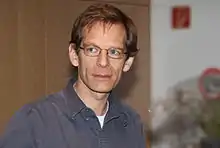Henning Stahlberg
Henning Stahlberg is a German physicist and Professor at the Swiss Federal Institute of Technology Lausanne and the University of Lausanne, Switzerland.
Henning Stahlberg | |
|---|---|
 Henning Stahlberg (2011) | |
| Born | Nov. 18, 1965 Berlin |
| Nationality | German and Swiss |
| Scientific career | |
| Fields | Physicist |
| Institutions | Berlin Institute of Technology, University of California, Davis, Biozentrum University of Basel, École Polytechnique Fédérale de Lausanne |
Life
Henning Stahlberg studied physics at the TU (Technische Universität) Berlin and graduated with a doctorate from the Swiss Federal Institute of Technology in Lausanne (EPFL) in 1997. He continued his research as a postdoctoral fellow at the Biozentrum, University of Basel for the following 6 years. From 2003 he joined the University of California in Davis as assistant professor, where he was promoted to tenured associate professor in 2007. From 2009 to 2020, Stahlberg was a Full Professor for Structural Biology at the Biozentrum of the University of Basel, where he headed the Center for Cellular Imaging and NanoAnalytics (C-CINA).[1] Since 2020, Stahlberg holds a dual-affiliation as a Full Professor for Physics at the Institute of Physics of the Basic Sciences division of the EPFL and as a Full Professor in the Faculty of Biology and Medicine of the University of Lausanne, Switzerland. He heads the Laboratory of Biological Microscopy at the EPFL and is establishing the Dubochet Center for Imaging in Lausanne.[2]
Work
Henning Stahlberg studies biological membrane systems from the atomic structure of individual proteins to the cellular context of the system. Employing cryo-electron microscopy, electron tomography, and correlative light and electron microscopy CLEM, he investigates the structure of ion channels[3] and membrane transporters,[4] and studies the molecular and cellular events in Parkinson's disease.[5] Further, he develops computational algorithms for the 3D reconstruction of proteins. Using these methods, Stahlberg successfully elucidated among other things the 3D structure of the Type III Secretion System (T3SS) in intact bacteria.[6] He developed the 2dx software to reconstruct the 3D structure of membrane proteins from cryo-electron microscopy images of 2D crystals, which the group merged into the FOCUS software for online data processing of cryo-EM data.[7][8][9]
Awards and honors
References
- C-CINA webarchive
- LBEM Homepage
- Kowal, Julia; Chami, Mohamed; Baumgartner, Paul; Arheit, Marcel; Chiu, Po-Lin; Rangl, Martina; Scheuring, Simon; Schröder, Gunnar F.; Nimigean, Crina M.; Stahlberg, Henning (2014). "Ligand-induced structural changes in the cyclic nucleotide-modulated potassium channel MloK1". Nature Communications. 5: 3106. Bibcode:2014NatCo...5.3106K. doi:10.1038/ncomms4106. PMC 4086158. PMID 24469021.
- Taylor, Nicholas M. I.; Manolaridis, Ioannis; Jackson, Scott M.; Kowal, Julia; Stahlberg, Henning; Locher, Kaspar P. (2017). "Structure of the human multidrug transporter ABCG2". Nature. 546 (7659): 504–509. Bibcode:2017Natur.546..504T. doi:10.1038/nature22345. hdl:20.500.11850/233014. PMID 28554189. S2CID 4461745.
- Shahmoradian, Sarah H.; et al. (2019). "Lewy pathology in Parkinson's disease consists of crowded organelles and lipid membranes". Nature Neuroscience. 22 (7): 1099–1109. doi:10.1038/s41593-019-0423-2. PMID 31235907. S2CID 195329364.
- Kudryashev, Mikhail; Stenta, Marco; Schmelz, Stefan; Amstutz, Marlise; Wiesand, Ulrich; Castaño-Díez, Daniel; Degiacomi, Matteo T.; Münnich, Stefan; Bleck, Christopher KE; Kowal, Julia; Diepold, Andreas; Heinz, Dirk W.; Dal Peraro, Matteo; Cornelis, Guy R.; Stahlberg, Henning (2013). "In situ structural analysis of the Yersinia enterocolitica injectisome". eLife. 2: e00792. doi:10.7554/eLife.00792. PMC 3728920. PMID 23908767.
- 2dx.org Homepage
- FOCUS Homepage
- LBEM Research Homepage
- CAREER award, NSF, USA
- Chancellor’s Fellows Award 2008
External links
- Research Group Henning Stahlberg
- Dubochet Center for Imaging
- Laboratory of Biological Electron Microscopy, EPFL
- Laboratory of Biological Electron Microscopy, University of Lausanne